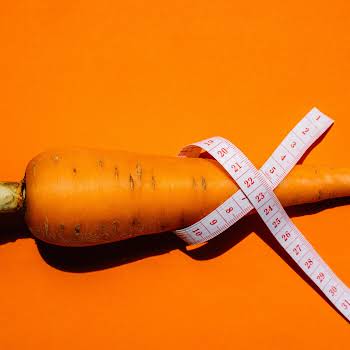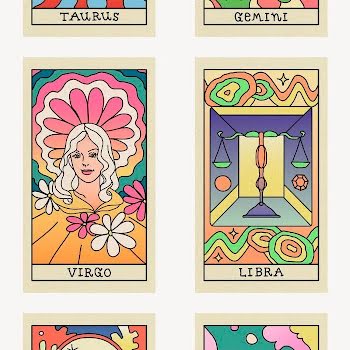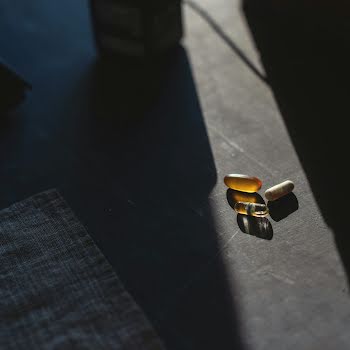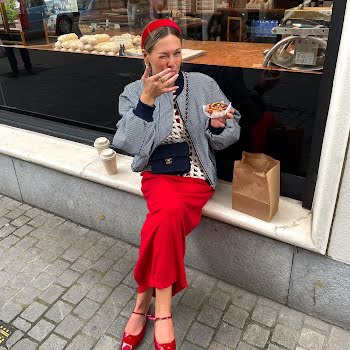
‘My internal organs were failing. Doctors said if I didn’t eat I would be dead in two weeks’
There has never been more pressure to be thin. We are constantly bombarded with images of waif-like celebrities, and online images are manipulated to look even more unnaturally slim. But we can’t simply blame social media for ‘causing’ eating disorders because that’s not how mental illness works. Amanda Cassidy reports.
Around 188,000 people in Ireland will experience an eating disorder at some point in their lives. There are about 1,800 new cases occurring each year. The gender gap has narrowed, but eating disorders remain more common amongst girls. The impact of an eating disorder on those affected can never be understated.
Stephanie McAlinden’s eating disorder began when she was just 11 years old. She believes her circumstances made her more vulnerable to an illness such as this.
“Biologically, I was genetically predisposed to an eating disorder: they run in my family as far back as anyone can remember. Psychologically, I have a lot of personality traits associated with eating disorders – I’m a perfectionist, I am obsessive, and can be controlling. Sociologically, I was an overweight child and whilst I was never bullied, I often heard remarks by adults about my size.
Related: Recovery from an eating disorder. Vicky’s story
Finally, environmentally, I was born into a culture obsessed with Western ideals of attractiveness – a notion that can be boiled down to thinness. There is likely not a girl born here that doesn’t internalise the message that thin equals pretty from a very young age.
“One of the saddest parts of modern society is how much weight loss is praised and celebrated. By the time I turned 12, four months later, I was constantly being told by everyone around me how good I looked.”
My trigger was really not that traumatic or uncommon an event: my kitten died. I remember it incredibly clearly, despite it being nearly 20 years now. It was the first time I had ever experienced such an incredible sense of sadness, or a life event that I could not control or try to change.
I had no idea how to deal with such an intense level of emotion, and flew into a panic, searching for anything I could think of that could possibly make me feel better. I landed on the one thing that so many adults in my life, as well as society in general, told me would help: losing weight.
For me, the simplest solution seemed to be to dramatically reduce the amount of food intake I consumed, beginning by cutting out parts of my diet. It began small: cutting out snacks and progressed very quickly to skipping a meal a day altogether.”

Social reinforcement
“One of the saddest parts of modern society is how much weight loss is praised and celebrated. By the time I turned 12, four months later, I was constantly being told by everyone around me how good I looked, how much more attractive, to keep up whatever I was doing. Weight loss is socially reinforced, even to children, and to a person at the beginning of an eating disorder, it justifies the behaviour they’re engaging in and motivates them to continue.
And of course, with weight loss, there is always the feeling you can do even better. If people think you look good now, imagine what they’d think of you if you lost a few more pounds.
“I had incredibly supportive friends, who did all that they could, in spite of the fact that they didn’t understand what was happening to me”
It is, of course, not solely to do with the reaction of others to your appearance, although it plays a huge part and not only in terms of how you rate your own attractiveness. You see then where the internal reward for an eating disorder comes from.
Someone once said to me that people with anorexia nervosa “eat the lack” – it is not that we eat nothing, but we are sustaining ourselves on the nothing that we eat. The nothing fills the void of sadness, of loneliness, of worthlessness that is driving the eating disorder behaviour.
By engaging in these behaviours, we force our attention with the underlying negative feelings about ourselves we are experiencing. At its core, it’s a type of avoidance – by fixating on our weight, on our measurements, on all these tiny little details, we don’t have to think about the emotional turmoil underneath.
I rapidly became incredibly withdrawn, my constant chatter suddenly gone silent, and I avoided social situations for fear of being looked at. I began to miss school at a more and more frequent rate, often flying into a panic attack as soon as I entered — at the idea of other people looking at me. I had incredibly supportive friends, who did all that they could, in spite of the fact that they didn’t understand what was happening to me.
To this day, I attribute their lack of judgement and unwavering dedication to sticking by me to the reason that I’m still here. If not for them, this story could have turned out very differently. In spite of their kindness, I remained very closed off. I did not confide in them, or in others, beyond an online blog where the anonymity offered me protection.
It was too difficult to put into words all that I was feeling, particularly when the feelings were so overwhelming and to anyone without an eating disorder, illogical.
Out of control
I knew by the age of 14 that the eating disorder was the one controlling me – but I no longer cared. I grew thinner and thinner, and sicker and sicker – hair coming away in clumps, my skin discoloured and a mess, passing out several times a day, and my brain left barely unable to form a coherent thought. I was killing myself and I knew it – but I just didn’t care anymore.
Two days after my fifteenth birthday, I collapsed and couldn’t wake up. My parents rushed me to hospital where I was immediately admitted. My parents were informed that my internal organs had begun to fail, and in two more weeks, I would be dead.
I was kept in a ward with incredibly ill children, and subject to glares and comments from their parents about people who had ‘self-inflicted’ problems, all of which just drove my guilt and self-loathing home. I was so isolated, and so desperately lonely, with nothing to do all day but stare at the food I couldn’t bring myself to eat. Worst of all, I received zero psychological help. Aside from the drugs prescribed by a psychiatrist: the treatment focus was entirely physical.
“It was incredibly frightening, especially given the fact I didn’t even know what was happening to me”
Anyone will tell you that the physical effects on an eating disorder are purely a single symptom, and nothing at all to do with the root cause – thus, any treatment administered to a symptom alone will have no long-lasting effect. As a result, I eventually realised that the only way to get out and back to my eating disorder was to gain enough weight to get out, and then I could focus on losing that weight again by returning to anorexia.
Self-harm
“They had fed my body but they hadn’t fed my mind”
Once I was released, I became very good at remaining on the threshold of the weight they told me I would be readmitted for, and so I was able to maintain this for several years. I remained severely depressed and consumed with self-loathing, frequently resorting to self-harm as a way to cope with no longer being able to hurt myself by depriving myself of food.
To make matters worse, when I turned 17, my bipolar disorder manifested. Bipolar disorder is typically thought of as either very happy or very sad, which is far from the truth. ‘Mania’, which people think of as the ‘happy’ part, is nearly as bad, if not worse, than the depressive side. During these manic episodes, I would destroy the relationships that mattered most to me in pursuit of my own high, and when I came down, I wouldn’t be even able to remember – least of all explain – why.
It was incredibly frightening, especially given the fact I didn’t even know what was happening to me – I remained undiagnosed until I was 25 when I once again relapsed with anorexia.

Saved
“Social media — Instagram in particular — has become a sprawling playground for both the fitness industry and the clean-eating empire”
What eventually saved me was the fact I was beginning my Master’s course at Queen’s University Belfast. I really wanted to do well – I had since gone back and done a Psychology undergrad after my first degree because I ultimately want to work in mental health. My younger brother is a professional body-builder so I got in touch with him about the best way to handle eating and exercise.
He was incredibly good about teaching me how food nutrition actually works – again, something instrumental in eating disorder treatment usually, but I never received – and did his best to try to teach me to be less afraid of food. I remained incredibly restrictive about food and terrified of certain food types – but I did begin to eat several times a day, something I hadn’t done since I was 12.
People ask me a lot if I feel social media is affecting eating disorders, and there is definitely some impact.
It’s never as simple as people like to think, but social media — Instagram in particular — has become a sprawling playground for both the fitness industry and the clean-eating empire.
These are both communities that are centred around diet and weight loss, and tend to assign moral attributes to food — good vs bad, clean vs dirty, etc — thus creating neuroses around certain types of food and often eliminating entire food groups as a result.
Eating disorders occur due to a complex combination of risk factors co-occurring. Prior to the advent of social media, we were still exposed to the thin ideal through magazines and television — but on a much smaller, and much less frequent scale.
Consider how many times a day we might check our social media, compared to the days before it existed, how often we might look at the TV or flick through a magazine. The level of shame associated with not conforming to the thin ideal has sky-rocketed too, particularly as people try to justify it as health.
People vulnerable to developing an eating disorder are now experiencing a much higher likelihood that they will encounter further risk factors, simply by the socially acceptable medium of social media, where people share photos of unattainable bodies, detail their own diet regime, discuss diet at length, and encourage others to do the same — often through means that are simply impossible for most of the population due to affordability or impracticality.
What social media is doing is making it more likely that a vulnerable person will end up triggering an eating disorder, when they might have otherwise not.”
Thin Ice
Harriet Parsons is the training coordinator at BodyWhys — the Eating Disorders Association of Ireland. She said it is hard to pinpoint the why when it comes to eating disorders
“People can initially fall anywhere on the spectrum from having normal but disordered eating, to having an illness that you end up hospitalised for. It is important to remember that how we feel affects how we feed ourselves. When it comes to more compulsive behaviour, alarm bells ring. One of the signs of the presence of an eating disorder is that food (eating it or avoiding it) has started to take over your life. These unhealthy patterns begin gradually and build to the point where a person feels unable to control them.
They feel like they have to follow those patterns. All usually involve emotional distress and eventually serious health consequences. We often get asked about ‘clean eating’ and if that type of obsessive behaviour is concerning, but obviously, it depends on the person. For those who feel like they can’t break their ‘food rules’ or their anxiety levels go up or their day is ruined, it no longer becomes about health.
Then you are functioning on a whole different level.”

Stephanie is now in a much better place than she was several years ago. She is currently working on her PhD about the stigma of eating disorders. She says she has made wonderfully supportive friends and describes her boyfriend as ‘quite literally a saint’.
“Mental health treatment has come a long, long way since my time in the hospital, and eating disorders are finally being recognised as a psychological issue rather than a physical one.
“Reach out and listen to them, and don’t make judgements”
“One of the things that ultimately made the biggest difference to improving my state of mind was the decision to be open about my eating disorder and my bipolar four years ago, rather than living in fear of being scorned or rejected.
Everyone has been incredible about it, and it has been a massive relief being able to just voice my discomforts around certain subjects or instances – for example, asking people to stop talking about ‘unhealthy’ foods or discussing diets, or being honest about not wanting to do a social activity involving food. I’m seeking proper, psychological help at last as well, on top of taking my medication.
My childhood friends stuck by me, even when my behaviour was frightening and inexplicable to them. My partner and the friends I have made through my PhD have been the ones that helped me feel I could speak openly about my illness, and have encouraged me to be a better version of myself. Many people with eating disorders, or indeed, any mental illness, don’t have the fantastic support system I have.
If you have a friend you know or suspect is going through something, I would encourage you to reach out. Reach out and listen to them, and don’t make judgements. Their illogical thoughts might not make sense to you, or might seem like they have an easy solution (anyone who’s had anorexia nervosa can tell you that the helpful advice ‘just eat!’ does not go down well), and you might feel ill-equipped to offer advice. You don’t need to – all you need to do is be there for the person you care about, and be someone they can turn to in times of distress. That, above all things, can make all the difference.
Mental health treatment has come a long, long way since my time in the hospital, and eating disorders are finally being recognised as a psychological issue rather than a physical one. I still have a lot of work to do in the process of recovery, but for the first time in my life, I feel like I do have a future – and one that isn’t so bleak.”
For more information and support you can contact Body Whys – the Eating Disorder Association of Ireland.
Image via Unsplash.com
Read more: Irish actress opens up about overcoming her eating disorder
Read more: Is our obsession with clean eating making us unhealthy?
Read more: The Kardashians are under fire for glorifying eating disorders























